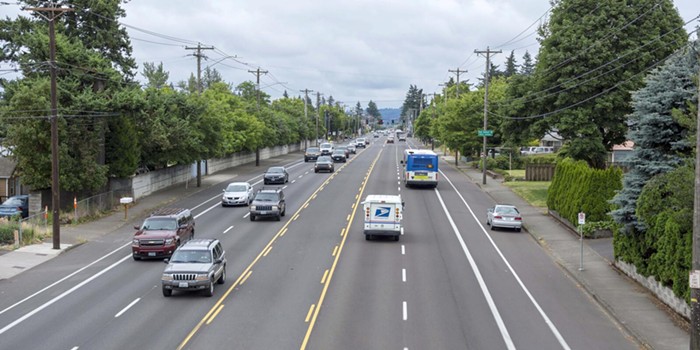THE LEADER of the Portland Police Association (PPA), the city's rank-and-file police union, says his group has "many concerns" regarding Mayor Charlie Hales' recently declared interest in outfitting cops with body-mounted cameras.
In a letter sent to members this month, PPA President Daryl Turner enumerates 11 specific issues—ranging from questions about the cost of purchasing and maintaining the cameras, to quibbles about their effectiveness, to worries that officers might waste valuable patrol time uploading and reviewing video.
Turner makes clear that the PPA remains officially neutral on Hales' idea. But he also argues the city will have to negotiate over the finer points of an official camera policy—an unsurprising request, given the cameras' potential effect on discipline and procedure.
And Turner's letter, first revealed by the Mercury, repeatedly stresses what he sees as some of the drawbacks of cameras: They might see more or less than what an officer sees, and also that they "shouldn't be viewed as a measure of truth. They have an important but limited use."
"The PPB's [Portland Police Bureau] desired implementation of body cams immediately triggers several subjects of mandatory bargaining," Turner writes. "The PPA has many concerns that need to be addressed and resolved."
Body cameras have become popular nationally as a means of reducing the use of force—but also in reducing potentially frivolous misconduct complaints. They came up in talks with a federal judge who approved, last month, a package of police reforms negotiated between the city, the US Department of Justice, the PPA, and the Albina Ministerial Alliance Coalition for Justice and Police Reform.
The reforms are meant to answer accusations that Portland police officers engaged in a pattern or practice of using excessive force against people with, or perceived to have, mental illness.
Police officials have experimented with cameras for years, in cars and also on cops themselves. Hales, as the Oregonian first reported, is interested in growing a recent pilot project in which a handful of cops wore body cameras. He's looking at tapping some $800,000 that had previously been allocated for dashboard cameras.
Pete Simpson, a police bureau spokesman, says a report on the body cameras is expected in late October—cautioning that the report will focus only on the "user experience" of wearing the cameras, in part because the sample size is too small to judge any changes in use of force or complaints. The bureau has tested three different kinds of cameras, two made by Taser, the company known for its namesake stun guns.
Ultimately, some 573 cops—patrol officers and sergeants, and members of the bureau's gang, youth services, traffic, and TriMet attachments—would wear cameras.
Hales' office, for its part, played down Turner's comments.
"He's completely correct," says spokesman Dana Haynes. "It was always intended that the union would play a role in how it rolled out. Of course. He knows that."
Turner, however, complained in his letter that he hadn't heard about Hales' interest until he read the newspapers. He also pointedly used the phrase "rumors of body cams have been swirling around."
More importantly, Turner has folded the PPA's concerns about the cameras into a longstanding call for increased police staffing. His letter asks for a 20 percent increase, saying it's "the most important component to the success" of federal reforms that promise improvements in how officers conduct community policing and deal with people in crisis.
In 2013, the city council cut the overall number of authorized officers, avoiding layoffs by allowing the bureau to gradually ease the number down through retirements and departures. This year, the council held the line—a scenario likely to repeat next year. Overall crime rates, meanwhile, have dropped in recent years.
"That's due to the hard work of our people out there who do the work every day. They're dedicated and diligent," Turner tells the Mercury, saying officers have been doing more with less, and drawing a lot of overtime in the process. "We're lucky to have made it as far as we have. But at some point in time, those resources will run out if we don't replenish them."


















